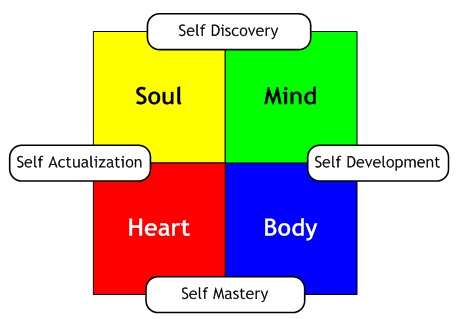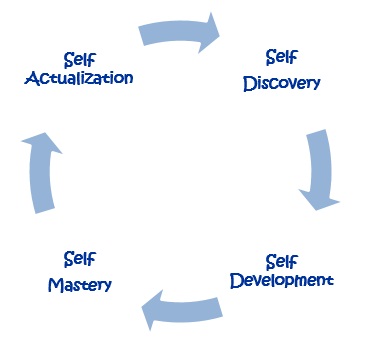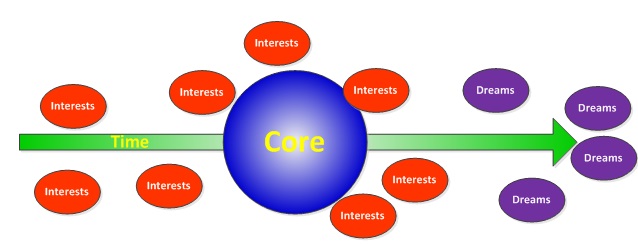Personal Development Process
The Personal development process begins with self-discovery and continues to self-actualization. Before you can development into the person you want to become, you must first start by finding out who you are and the skills and abilities that you possess. Through the process of continuously assessing and developing your skills and abilities, you will be able to eventually master your abilities and yourself. And hopefully, you will ultimately be able to realize your fullest potential and reach self-actualization.
Self-Discovery
Self-discovery is the first step in personal development. Self-Discoveryis the process of gaining a deep understanding of your own self, character, needs, values, and purpose in life. It is the exploration of your inner self in an attempt to discover who you are, your potential, your purpose in life, and what core principles are guiding you to take different paths along the way.
The key components to self-discovery are self-reflection and self-awareness. Self-discovery can also include exploration of personal interests as well as hopes and dreams for the future. Self-discovery leads to self-knowledge which will enable you to guide yourself towards situations and experiences in which you will thrive.
The self-discovery process includes:
Self-Reflection
Self-Awareness
Interest Awareness
Hopes & Dreams
Self-Reflection
The first step in the self-discovery process is self-reflection. You must make the time to stop and really think about who you are. If you want to achieve self-awareness, you need to take the time to step outside of your experiences and actions and reflect on them. A person can have numerous experiences in life, but still lack self-awareness. Quiet meditation and reflection will allow you to refocus your mind and concentrate on your inner self, and allow you to examine the way you “see” yourself.
Since we are all different in the way we think, feel, act, learn, and perceive the world, you must take the time to reflect in order to gain a better insight into yourself. Self-Reflection allows you to explore your individual personality, natural preferences, values, beliefs, preferred styles and tendencies in order to become self-aware. You can also reflect on your personal interests and your dreams.
Self-Awareness
Self-reflection leads right into self-awareness. Through reflection of your preferences, values, beliefs, and tendencies, you become aware of who you are. Self-Awareness can be defined as “having an insightful understanding of your personality, values, tendencies, and beliefs.” The key areas for self-awareness include your personality traits, values, emotions, habits, and the psychological needs that motivate your behaviors. Some people group personal interests and aspirations into self-awareness. We, however, break them into three groups; self-awareness, interest awareness, and hope & dreams. We believe that if they are categorized and viewed as three separate elements, they can be addressed separately and with different techniques. For many of us, the core of who we are does not change significantly over time. Our belief, values, principles, and tendencies (what we focus on for self-awareness) tend to remain fairly constant over our lifetime. If they do change, they usually only change slightly and slowly over time. In contrast, interests and aspirations can change quite frequently over time (i.e. what you are interested in today, you may not be interested in a few weeks).
Self-awareness is about knowing and understanding the core of who you are:
- your beliefs and principles
- your own emotions
- what motivates you
- your thinking patterns
- your tendencies to react to certain situations
- what you want out of life
Interest Awareness
Unlike many of the elements of self-awareness, where you explore traits and tendencies that remain mostly constant throughout your life, your interests often change as you grow and experience life. It is important to identify what interests you because by knowing what you enjoy you can do more of those activities.
Hopes and Dreams
As your interests are in the here and the now, your hopes and dreams are for your future. Your hopes and dreams are wishes or aspiration for your future. They are thoughts and mental images of your futures that conger up positive emotions. These too have a tendency to change over the years. What you hope for when you were 5 years old may be very different from what you hope for at 15 years old and 30 years old.
Self-Development
Self-Development is a process of consciously improving yourself in various aspects of your life. It is the conscious pursuit of personal growth by improving personal skills, competencies, talents, and knowledge in order to seek self-fulfillment and proactively reach your fullest potential. Self-development enables you to assess your skills and talents, to set goals, and then take action to help you to achieve those goals and to maximize your potential.
Self-Development has several elements including;
Self-Knowledge
Self-Assessment
Action Steps (Skill Enhancement & Personal Growth)
Self-knowledge
Self-knowledge is the bridge between self-discovery and self-development. Self-knowledge identifies what you know about yourself. It is the information you accumulate during self-discovery. It is with self-knowledge you are able to understand your principles, values, and your purpose and are able to apply it to your life. With self-knowledge you can understand your strengths to build upon, as well as identify areas where you would like to make improvements.
As we noted above, you do not typically change your personality, your values, or your needs based on what you learn about ourselves. However, an understanding of your personality and characteristics can help guide you towards situations and experiences in which you will thrive. Self-knowledge can also help you avoid those circumstances in which you will experience stress.
In addition to self-discovery, we can also gain self-knowledge through self-assessment. It is through self-assessment that we learn where strengths lie as well as determine which areas we can improve upon.
Self-Assessment
Self-assessment is the process of gathering information about your own aptitude, skills, competencies, and talents and critically reviewing the quality of your performance and abilities. Self-Assessment is different from self-awareness and self-discovery in that awareness and discovery is simply a recognition of something or knowing something exists. Assessment, on the other hand, is determining or measuring an amount, value, importance, extent, or rate of something.
You can fairly easily assess your skills and abilities. Although more challenging, you can also access and measure your attitudes, beliefs and judgments you have about yourself. Those assessments may include your self-image, self-esteem, self-efficacy, and self-confidence.
Self-assessment gives you the information needed to create an effective development plan. A development plan involves the making of goals or benchmarks that help define the path that you intend to follow. By knowing what specific skills you need to develop or work on, you are able to focus your attention on those skills and making yourself more proficient at them. You force yourself to focus on the acquisition of knowledge and to organize your resources, thus allowing you to become more organized and effective. As you become more effective, you can improve both your abilities and ultimately your performance.
Action Steps – Skill Enhancement
The main component of self-development is the actual development of skills and personal growth. You should continuously look for ways to develop your skills, abilities, and competencies to enhance your performance. Through effective skill enhancement, you become more capable, competent, and confident in yourself and your abilities, and are better able to reach your goals. You should also focus on developing your personal effectiveness. Personal Effectiveness focuses on personal skills such as time management, organization, problem solving, and decision making. Developing your Personal Effectiveness helps enhance your overall ability to perform various tasks and activities in your daily life. Developments of these skills allow you to become more capable, competent, and confident and ultimately help you reach your goals.
Personal growth (growing as a person) is also an important part of the action steps. Personal growth can be perceived as becoming a better person by modifying personal attitudes, traits, and characteristics (e.g. becoming more patient, becoming more understanding, or developing a more positive attitude). Personal growth would also include building self-esteem, self-image, and self-confidence.
Continuous self-development will lead to self-mastery.
Self-Mastery
Self-mastery is the ability to recognize, understand, control, and make the most out of your physical, mental, emotional, and spiritual self. It is gained thorough awareness, understanding, and control over your thoughts, emotions, and actions. Essentially, self-mastery gives you control over the one thing you can control in any given situation: yourself.
Self-mastery over your own thoughts, emotions, words, and actions can change and transform your life and yourself. When negative thoughts arise, emotions can become unsettled and your resulting actions can have negative consequences. With self-mastery, you can reign in your thoughts and emotions, and begin to control your actions. Self-mastery will help you control your emotional impulses and allow you to make decisions based on rational thinking instead of heightened emotions.
Self-Actualization
Self-Actualization is seeking personal growth through peak experiences in order to realize your fullest potential and reach self-fulfillment. Self-actualization is often thought of or viewed as a destination or a process, but it is really a state of being. It is when you can say, “I am being all that I am, and all that I was meant to be.” Self-actualization is the ultimate goal of personal development.






